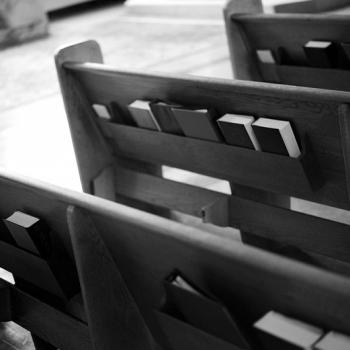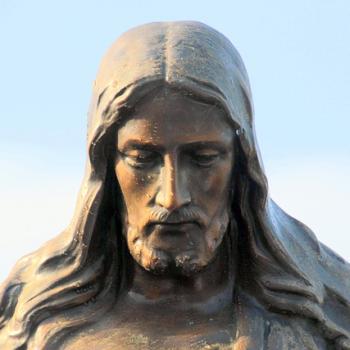
While this post was originally written independently of the Patheos Catholic Channel series, “Catholicity: Identity and Its Discontents” we have been encouraged to run it together with the symposium because of it’s thematic fit. Steel Magnificat both cordially invites and heartily encourages our readers to read more here.
July is over. Thanks be to God, thanks be to God, eternal thanks be to God.
I don’t know how the general public feels about July, but it’s the month I dread more than any other. Every year, in the Ohio Valley, July ushers in the yearly heat wave and droughty patch. It gets worse as the month progresses; it will continue to be awful for a week or two more, but the worst is over once July is over.
As I mentioned last week, my chronic illness does not like heat. I will gain 20 pounds of pure angry swelling when the weather gets over about 84 degrees. When it gets over 90 degrees, my hands and feet start to fall asleep and my mouth goes numb like a beak. My digestion goes haywire; my joints swell so it hurts to walk. But that hardly matters, because the fatigue is so bad I don’t want to walk anyway. Sometimes this happens at other times of the year, too, in reaction to triggers other than hot weather. Sometimes it takes a day or two of hot weather before the flare-up sets in. Sometimes I have a day with the illusion of remission; I celebrate by taking my daughter to the pool and pretending to be a normal mom. But it never lasts. July is always hell.
I spend a lot of time online when I’m sick, so I’ve read a lot of blog posts by a lot of chronically ill people. But it strikes me that I’ve never read one by a Catholic, so I wanted to mention what it’s like, for us. I imagine there are a lot of chronically ill Catholics out there who feel as alone as I do, and there are a lot of healthy Catholics who don’t realize that this little sub-group exists. So in the interest of information, here I am. This is what I’ve found.
First of all, it’s lonely to be chronically ill, and it’s lonely in a particularly painful way. The fact is that, when you become chronically ill, you’re going to find that a lot of fair-weather friends distance themselves from you. Sometimes they tell you to your face that you’re a burden, and sometimes they just make excuses not to see you, not to help. Sometimes they stop noticing you as you become more and more reclusive. Sometimes, they assume you’re using sickness as an excuse to separate yourself from them. Most people you know will assume that someone else is taking care of you, and you’ll find yourself alone. This is hard. It’s especially hard for me as a Catholic, because we’re supposed to know not to do that. We’re all told, from the time we’re children, that God will separate the sheep from the goats and cast those who don’t care for the sick into hell. Yet here I am, at the heart of a very vibrant, vocal, politically active Catholic community in the Ohio Valley, and I’m more or less shunned. I have tried to be a part of several different groups and ask for help when I needed it, and it always goes horribly. I’ve accepted that I’m not going to have a lot of Catholic friends unless I somehow become healthy. And, I admit, this is hard on my faith some days. Catholics aren’t supposed to act like everybody else. It was a very rude awakening to find that they do.
Secondly, chronic illness makes me feel guilty. Maybe this is just me, but I wonder if most chronically ill Catholics don’t feel this way. We’re supposed to care for the sick and perform the other works of mercy, and during a flare-up I can’t even make dinner for my own daughter. I’d love to go out and care for someone else, but I can’t. When I was a child, I dreamed of becoming a nun, but I couldn’t. When I was in the Latin Rite I wanted to go to daily Mass but usually couldn’t; now that I’m going to liturgies in the Byzantine rite, it’s even harder to get to their rare daily liturgies. When I am at Divine Liturgy, I often have to sit down during all the standing parts, despite an upbringing of being told that only bad Catholics sit when they should be standing or kneeling.
I would love to go to confession regularly, but priests aren’t coming to my house any more than Catholic lay people are, and it’s very hard to get to them. I’ll never forget the time I dragged myself to campus to go to confession for the first time in months; I somehow walked there, I was the last in line, I waited an hour, and then a gruff priest closed the line with only me left and sent me home empty-handed because it was time to start Mass. He didn’t offer to hear my confession himself; he just told me to come back the next day.













